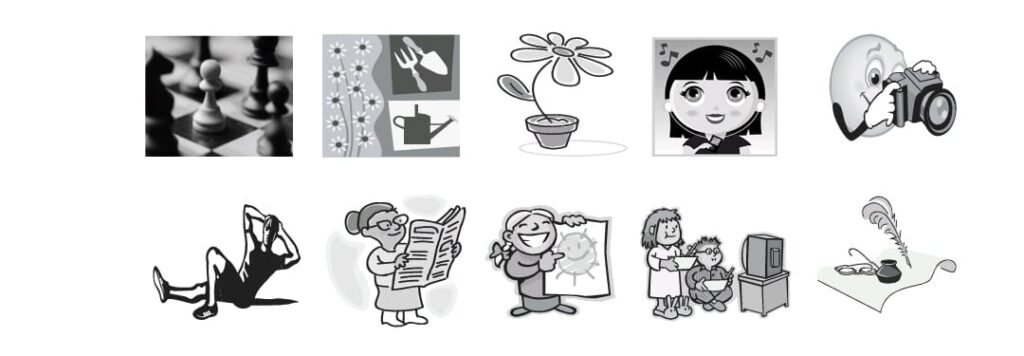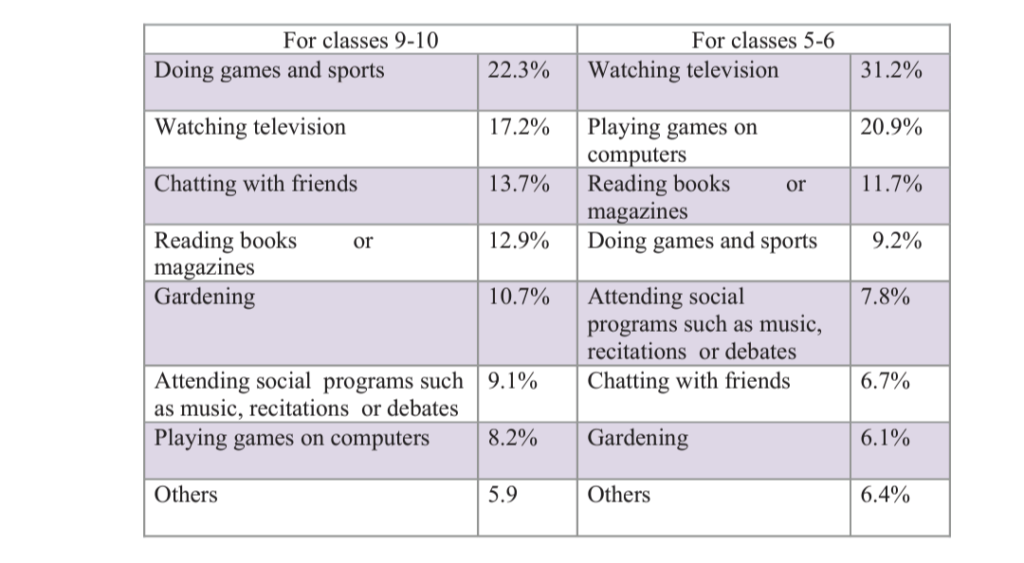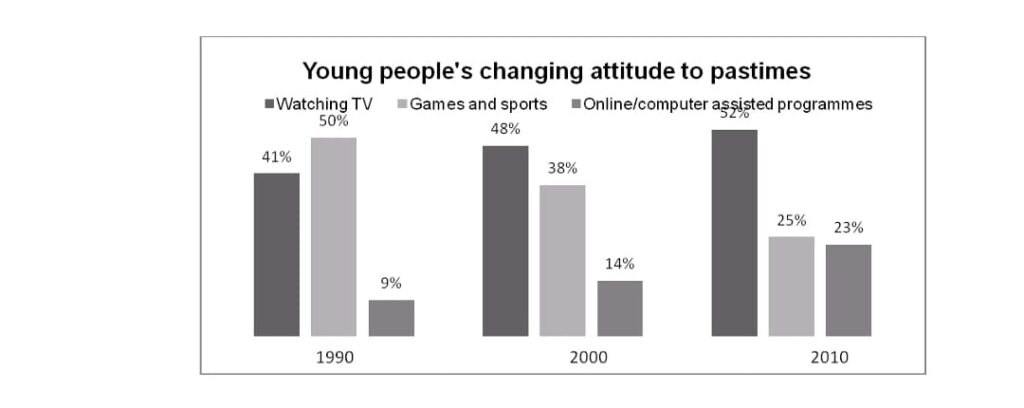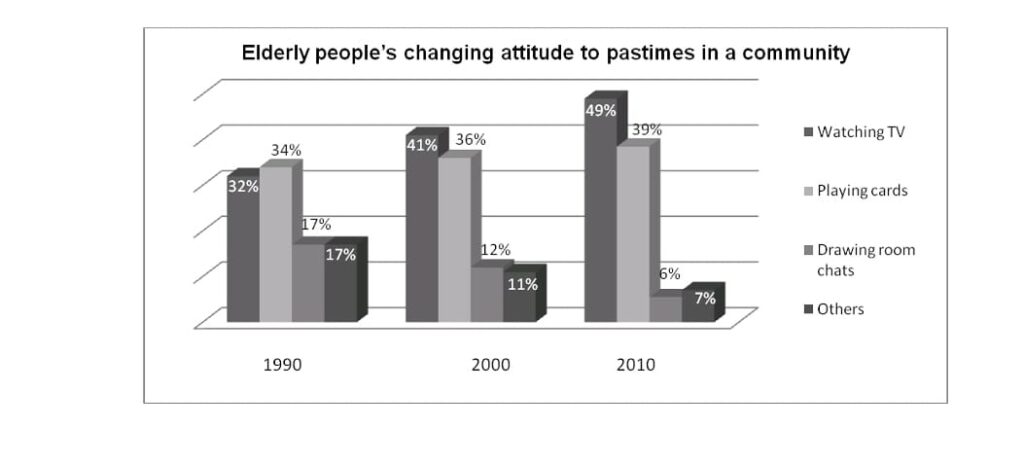Lesson 1: Have you any favourite pastime?
[A] Look at the pictures. What are the people doing here? When do people do these kinds of work?

Answer: Playing, Cooking, Gardening, Listening to music, capturing photos, exercising, reading newspaper, drawing, watching TV, writing.
[B] Tiya Listen to the dialogue and answer the questions.
Tiya : Anusha, what happens? You’ve sports trousers, T-shirts, sports shoes, and a carry bag! Where are you coming from? And you look tired!
Anusha : Not exactly, Tiya. I’m great because I’m just from the gym.
Tiya : Do you go to the gym regularly?
Anusha : Almost yes. I go twice a week. It’s one of my favourite pastimes.
Tiya : Really! Going to the gym is your favourite pastime! You make me laugh!
Anusha : Almost yes. I go twice a week. It’s one of my favourite pastimes.
Anusha : Why not? I like sports because I like to keep in shape. I’m not a lazy person like you!
Tiya : What do you do there?
Anusha : I do yoga.
Tiya : Don’t you have any other pastimes?
Anusha: Hmm…yes, I have. I like playing chess, painting, and reading books when I’m free. I also like photography but I’m yet to learn it. What do you do for pastime?
Tiya : I like watching TV, listening to music, reading books and magazines, and playing games on the computer. I do like gardening. But we don’t have sufficient space. So I do pot planting. By the way, I don’t know much about yoga. Would you please tell me about it?
Anusha : Sure! I’ll give an article on it. It will help you know about it. Okay?
Questions
1. Why does Anusha like going to the gym?
Answer: Anusha likes to going to the gym because she likes to keep herself in shape.
2. What are her pastimes?
Answer: Her favourite pastimes are going to the gym, playing chess, painting, reading books, photography.
3. Make a list of Tiya’s pastimes.
Answer: Watching TV, listening to music, reading books and magazines, playing games on the computer, gardening.
4. How will Tiya learn about yoga?
Answer: Tiya you will learn about yoga by reading an article.
[C] Read the following texts. Then check () the statements below:
Yoga: Tap into the many health benefits
Suppose your kids are demanding the latest video game, your boss wants that report done today by five, and your partner wants to know what’s for dinner tonight. Stress and anxiety are everywhere. In this situation, to keep fit as well as to give them the best you need to do something. And here comes yoga to help you.
Understanding yoga
Yoga is a kind of posture and breathing exercises. It brings together physical and mental disciplines to achieve peace of body and mind, helping you relax and manage stress and anxiety. Traditional yoga puts emphasis on behavior, diet and meditation. But if you’re just looking for better stress management— and not an entire lifestyle change, yoga can still help. Youga trainers gradually choose easier to complex activities for practitioners. However, all practitioners do not necessarily need the same kinds of practice.
The health benefits of yoga
The potential health benefits of yoga are numerous and may include:
Stress reduction. With its quiet, precise movements, yoga draws your focus away from your busy, chaotic day and towards calm as you move your body through poses that require balance and concentration.
Increased fitness. As you learn and refine new poses, you may enjoy improved balance, flexibility, range of motion and strength. And this means you’re less likely to injure yourself in other physical endeavors or in your daily activities.
Management of chronic health conditions. Yoga might help with a variety of health conditions, such as cancer, depression, pain, anxiety and insomnia, fatigue and mood. Yoga can also help reduce heart rate and blood pressure.
Weight loss. If you’re overweight or have eating disorder, yoga may help you make the healthy lifestyle changes necessary to gain control of your eating and drop those extra pounds.
While you shouldn’t expect yoga to cure you or offer you relief 100 percent, it can help some health conditions when combined with standard treatment. And if you already enjoy good health, yoga can be an enjoyable supplement to your regular fitness routine.
[D] Work in pairs. Talk about these questions. Give your own opinions.
1. How does exercise work on our memory?
Answer: Exercise can have positive impact on our memory in several ways. Exercise increases blood flow and certain levels of hormones and proteins to the brain which has been linked to improved memory and learning. Exercise can help reduce stress and improve mood, both of which can have a positive impact on memory.
2. What other benefits can you think of from exercise?
Answer: Exercise reduces anxiety and stress. It prevents us from the risk of chronic diseases. It strengthens our body and muscles.
3. What is the most important benefit of exercise to you and why?
Answer: The most important benefit of exercise to me is good health. Health is wealth. It is exercise that can keep us healthy both physically and mentally. If we are fit physically and mentally we live happily for us and for others too.
[ E ] Complete the sentences.
(a) Yoga is a practice of posture and breathing.
(b) Traditional Yoga works through behaviour, diet and meditation.
(c) Yoga is very effective in managing stress.
(d) Through the poses of balance and concentration Yoga reduce stress and anxiety.
(e) Improved balance, flexibility, range of motion and strength results in increased fitness.
(f) Yoga can reduce or work for heart rate and blood pressure.
(g) Yoga can control a variety of health conditions, such as cancer, depression, anxiety, insomnia, fatigue and mood.
(h) Yoga cannot cure 100 percent, but it can help some health conditions when combined with standard treatment.
[F] Check (√) the statements about aerobics below.
(a) Yoga improves fitness.(√)
(b) Yoga has little to do with eating habits.
(c) It may differ according to doer levels. (√)
(d) It helps people shake off all types of physical and mental disorders.
(e) It works both on body and mind together. (√)
(f) It helps practitioners undergo similar level of difficulty.
(g) If you know yoga, you have better control over your real life hazards.
(h) It also helps you live longer.(√)
[G] Read the text.
Hi, I’m Shyam. I’m from Magura. Though district headquarters, it’s a small town. I’m in grade 9 now in Chander Hut Bidyaloya. I love games and sports very much. My father was an athlete in his student life. He inspires me to follow his footsteps and take part in games and sports or do some exercise besides my studies. So I get up early in the morning and take a walk with my father almost every day. We walk for about an hour. At school, during break I play kabadi, gollachut, badminton, table tennis, and carom. Sometimes I practise the high jump and the long jump outside the school campus. Playing football in the nearest college ground is a passion for me. I like watching television too. I watch sports programmes on different TV channels during my free times. I’m a fan of National Geographic, Discovery, and Animal Planet for their documentaries as they are quite interesting as well as educative. Recently my father has presented me with a flashy camera as he was very happy with my junior secondary scholarship exams. When I hold the camera, I feel so excited! I wish I could be an amateur photographer in future – not to snap only personal photographs at different parties but to shoot our beautiful Bangladesh. I’m sure that soon photography will be my most favourite pastime.
[H] Work in pairs.
Read the statements of the following grid. First match the parts in Column B and Column C to make complete sentences. Then make questions for the statements in Column A.
Answer:
| Column A | Column B | Column C |
| What is special about Magura? | Despite the fact that Magura is a district headquarters, | it is a small town. |
| When was his father an sportsman? | His father was an sportsman | in his student life. |
| How does he encourage? | He encourages him for games and sports | during break at school. |
| What does Shyam enjoy beside his studies? | Shyam enjoys playing different games and sports | beside his stiudies. |
| Who walks with him? | He walks | with his father. |
| How long do they walk? | They walk | for half an hour |
| Why does he prefer programmes on nature and life? | He prefers programmes on nature and life | for their educative values. |
| What does he watch on different TV channels? | He watches sports programmes | on different TV channels. |
Lesson 2: Reading really helps!
[A] Read the conversation and tell what Anusha is going to read.
Anusha : Tiya, hope you enjoyed the article on yoga.
Tiya : Yes, it’s great. By the way, Anusha, how did you enjoy London Olympics as a sports lover?
Anusha : People rightly say that it is the greatest show on earth. I’m still thrilled to remember what Michael Phelps and Usain Bolt have shown. Amazing!
Tiya : Right you are. They are incredible. However, I’ve got an interesting article in the net on Michael Phelps and Usain Bolt. You might like it and take part in the debate on who is better between these two greats. Please read it.
Anusha : Ahh… Michael Phelps and Usain Bolt! Thank you Tiya! I would love to read it.
B. Read the text and answer the following questions.
MICHAEL PHELPS, USAIN BOLT ARE GREAT, BUT WHO IS BETTER?
With the curtains closing on the 2012 London Olympics, it’s impossible not to look back and reflect on the greatest performances by Olympic athletes.

The Olympics have many memorable moments and athletes we’ll remember by name alone. The list is quite big. Michael Phelps and Usain Bolt are the latest addition to this list of the bests. They make London Olympics stand apart. If there is any question like this: “What is the standout performance of London 2012?”, perhaps the answer is “ The London Games gave us Michael Phelps vs. Usain Bolt.” The first one is an already decorated Olympian, who puts the finishing touches on his great athletic careers. And another comes up with a new definition of fast.
Two of the most popular Olympic sports, sprinting and swimming, saw their two biggest stars and captivated audiences. They’d also dominated the 2008 Beijing Games, but Phelps and Bolt cemented their legacies in London. Phelps, the American swimmer, passed gymnast Larissa Latynia for the most Olympic medals ever. Bolt was the third man to repeat as a 100-meter gold medalist and the first as a 200-meter gold medalist, and he broke his own Olympic record by running the 100 in 9.63 seconds. Once Phelps and Bolt were back in their pool and track, the story lines changed.
Phelps is the most-decorated Olympian ever, with 22 overall medals: 18 gold, two silver, two bronze. Bolt is the most accomplished Olympic sprinter, with the unprecedented double, making clear that he’s the fastest man in the world.
But there’s a debate: Who had the better Olympics? It’d be tough to top Phelps’ eight gold medals in Beijing, but what if we’re only talking London?
London was Phelps’ grand finale. He won four golds and two silvers in seven events, and he says he’ll never race again.
London was Bolt’s chance to prove he’s still the greatest. Bolt wins six gold medals in six Olympic finals. He is the first man ever in the history of the modern Games to sweep the 100 and 200 in back-to-back Olympics. Not to mention the addition of back-to-back relay golds.
And Bolt became a legend, in his own words. Phelps already was. Bolt is just 25 years old, so there is no telling how long he can be on top of the sprinting world. What if he decides to “retire” from sprinting to focus on the 400 meters, just to break another world record or two? It would be amazing—and entirely plausible for him to accomplish.
Who had the better 2012 Games? You tell us, let the debate begin.
[adapted from USA Today, Sports London 2012]
Questions
1. What makes London Olympic 2012 exceptionally sensational?
2. How are Phelps and Bolt brilliantly similar and different?
3. Between these two Olympians who has bagged the highest honour within the same time frame?
4. What is special in bolt so far?
5. How does Bolt evaluate himself?
C Make two flow charts on Michel Phelps and Usain Bolt. The first two are done for you.
D Read the following text and complete the blank spaces with the appropriate words from the box below.
answer, sprinter, Olympians, speed, Olympics, swimmer, debate, legends, retired, prove, histories, biggest
These are the stories of two most successful Olympians of the history. While one is famous as the fastest swimmer, the other as the fastest sprinter of the world. However, both are unparallel for their speed in their own field. They made history in the Beijing Olympics. They have made newer histories in the London Olympics too. They are the living legends now. Though Phelps has retired from his race, Bolt has prospects to prove himself in the next Olympic as well. After the biggest show on earth is over in London, this debate will go on – who is better. Only time will answer this question.
Lesson: 3 Change in pastime
[A] Read the text.
Childhood outdoor pastimes ‘in decline’
Traditional childhood pastimes of climbing trees and playing conkers are in decline, according to survey by the RSPB (Royal Society for the Protection of Birds). It’s a charitable organisation registered in England and Wales.
The survey shows that people under 34 recall far fewer such childhood outdoor experiences than people over 55 s according to a survey by RSPB.
People were asked which of the twelve Childhood outdoor experiences they could remember. The answer included making dens, daisy chains, climbing trees, playing conkers and feeding birds. Four out of five boys climbed trees and the same number of girls made daisy chains. But the survey showed the numbers declining among the newer generations. Some 15% more of those aged over 55 had these outdoor experiences in their childhood, compared with those between 15-34 years old. Some 92% of the public agreed that experiences of nature were still important to children, and 82% agreed that schools should play a role in providing them to all children.
The survey has highlighted the positive impact of contact with nature on a child’s education, health, well being and social skills. At the same time, there has been a decline in these opportunities, with negative consequences for children, families and society-a condition now known as nature deficit disorder.
Mike Clarke, chief executive of the RSPB, will meet parliament members to urge the government to join other organisations in providing children with first hand experiences of the natural environment. “We believe this guidance should include the many positive impacts to children of having contact with nature and learning outside the classroom.”
[Adapted from BBC news 6 September 2010]
B. Read the following words and write their meanings as you understand them from the context. If you don’t understand, check the words from a dictionary.
conkers……………a children’s game
dens ……………….hole
decline…decrease
highlight………….point out
impact……result
consequence…….effect
disorder……………a state of confusion
urge………………… Desire
C. Read the following statement taken from the text in A and say what the subject of comparison is. Find out the other comparison in the text above.
The survey shows that people under 34 recall fewer such childhood outdoor experiences than people over 55, according to a survey by Ipsos Mori for RSPB.
Answer: The subject of comparison is declination of childhood outdoor pastimes.
Some 15% more of those aged over 55 had these outdoor experiences in their childhood, compared with those between 15-34 years old. Some 92% of the public agreed that experiences of nature were still important to children, and 82% agreed that schools should play a role in providing them to all children.
D. Do you agree that if children have more contacts with nature, these will have a positive impact on them? Make a list of the benefits or harms they may have if taken to nature frequently.
Answer: Yes, I agree that if children have more contacts with nature, these will have a positive impact on them.
Benefits: improved physical health, boosted cognitive development, reduced stress, improved mental health,increased social skills, appreciation for nature.
Harms: risk of injury, exposure to environmental hazards, allergies, increased sun exposure, disruption of routine.
E. Speak to the senior citizens in your home or community. Ask them about their pastime activities and take notes on them. Then write a paragraph in the style of the text given in Section A to show the differences. Also mention why these differences have taken place.
Lesson: 4 Change in pastimes in Bangladesh
A. Tiya and Anusha decided to make a survey on students’ pastimes in their class. After the survey they presented their findings in a chart. Look at the chart and read how they explain their findings.

Tiya: Hello everyone! My name is Tiya. My friend, Anusha and I are going to do a presentation on Pastime Habits of Classes 9 and 10 students in our school. There are 120 students, 60 in class 9 and 60 in class 10. The classes have gender equity. Each class has 30 male and 30 female students. The survey shows that 22.3 percent of students in classes 9-10 like games and sports as their most favourite pastime, which is the 4lh option given by classes 5-6 students. Watching television is the second choice (17.2%) by the first group in contrast to 31.2% of the second group. It is noteworthy that watching television is the first choice of the second group. A considerable number (13.7%) of 9-10 students like to chat with their friends and thus it becomes the third popular choice in the chart while this becomes one of the less important choices by the younger kids. Only 6.7% of the kids take it as their first priority. It’s interesting that both the groups like reading books. 12.9% of students of classes 9-10 take it as their favourite pastime. The number is 11.7% for Classes 5-6 students. Besides, gardening is voted (10.7% of students) to be the 5th preference by the grown up group though it is not that much liked by the younger group. Only 6.1 % of the young kids are involved in it. This is interesting that though the higher number of students in classes 9-10 prefer attending social programs (9.1%) than students of classes 5-6 (7.8%), yet as a choice it is preferred by the latter group. It is the 5 th choice for them while to the older group it is the 6th. Young kids have greater fascination for playing games on the computers (20.9% like it as their first choice). The chart shows that as the kids grow up, they lose their passion for computer games. According to the chart the ratio declines to 8.2% from 20.9% when the kids are students of classes 9-10. Finally, it can be said that the influence of television has impact on both the groups but the more students grow up, the more they opt for fields/ gym.
Questions
1. What are the gender policy of the surveyors?
Answer: The surveyors chose equal number of boys and girls for their survey.
2. What are the survey findings regarding watching television?
Answer: Watching television is the second choice (17.2%) by the first group in contrast to 31.2% of the second group. It is noteworthy that watching television is the first choice of the second group.
3. Which age group is more interested in socializing with others?
Answer: Students of class 9-10 are more interested in socializing with others.
4. According to the chart, how do the kids change their pastimes when they are grown up? What changes does the chart for 9-10 reflect ?
Answer: The kids lose their passion for computer games when they are grown up. According to the chart the ratio declines to 8.2% from 20.9% when the kids are students of classes 9-10.
B. Work in groups. Make a chart on the pastimes of the students in your class and present it to your class.
Lesson: 5 Pastimes vary
A. Read the conversation. What is it about? Do you agree or disagree?
Tiya : Anusha, I really wonder how pastimes vary from generation to generation.
Anusha : Oh yes. I can tell you how.
Tiya : Although I don’t know exactly, I think time is a big factor.
Anusha : You are right. Time changes many things. It changes our tastes and abilities. Technology has roles too. Look, there was a time when playing in the fields was very popular because we had many open fields around. Going to neighbours’ houses and hanging out in groups were popular pastimes as well. You won’t see these activities now. The process of urbanization, the aggression of satellite television and people’s dependence on technology have changed our lifestyle. Now boys and girls of urban and semi-urban areas are more dependent on the computer for social networking, video games, or computer assisted programmes.
Tiya : Right. But how do you know all these things, Anusha?
Anusha : Oh….I read an interesting article on people’s changing pastimes. It analyses the issue through a graph. Here it is.Read, and I’m sure you will enjoy it.
B. Read the article. Underline the words/expressions used in the article to show the changes in the data. The first one is done for you in the text.

There is change in people’s preferences for pastimes. A recent survey shows that during the last twenty years, teenagers have gone through significant changes in choosing their pastimes. The survey results are presented through a graph which shows that there is a steady rise in young people’s tendency to watch TV. In 1990,41% of teenagers liked watching TV which increased to 48% in the next ten years and it further increased to 52% in the next decade. Unfortunately, the picture is grim in terms of young people’s attraction to field games and sports. While 50% of youngsters opted for games and sports in the 1990s, the figure was 12% less after a decade at 38%. Unfortunately the falling tendency persisted through the next ten years and by 2010 it came down to 25%. Though the young people have dissociated themselves noticeably from games and sports, there is a sharp and steady rise in their association with online or computer assisted programmes. In 1990 when the users of online or computer for pastimes were only 9%, in 2000 the number nearly doubled and reached 14%, and with a rapid increase in the next ten years it shot up to 23%.
The survey also explains the reasons for this change. It says that television has become a part of everyday life even to the underprivileged section of society. This has resulted in larger number of young people opting for watching TV as one of the most favourite pastimes. The increasing urbanization has reduced the number of open fields. Therefore, there is a fall in selecting games and sports as favourite pastimes, though it’s not a good news for the country. And the reason for selecting the computer assisted or online programmes is that computer technology is getting cheaper, easier and more popular every day. Indeed our young generations are stepping into the e-world.
C. Now work in groups and analyse the following graph.




